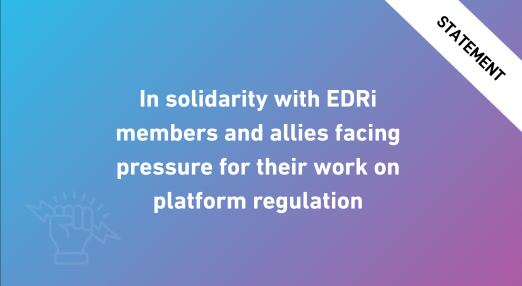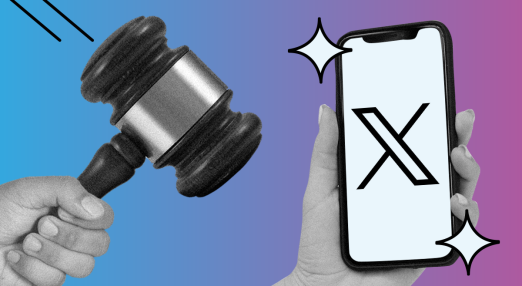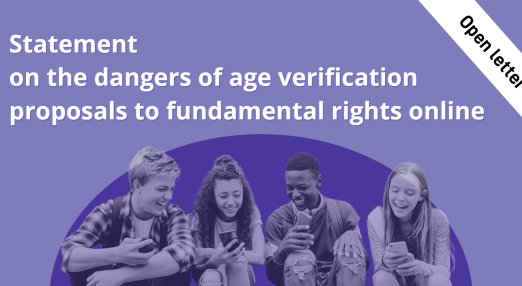Freedom of expression online
Filter resources
-

Statement of solidarity with EDRi members and allies facing pressure for their work on platform regulation
The EDRi network strongly condemns the pressure of the US Trump administration on EDRi members and allies for our work on online platform regulation.
Read more
-

#DIDit: EDRi members spark movement for alternatives to Big Tech
At the 39th Chaos Communication Congress (39C3), German author Marc-Uwe Kling helped launch the idea of a monthly “Digital Independence Day” with a broad coalition of civil society organisations. On the first Sunday of each month, participants explore alternatives to dominant digital platforms, share experiences using #DIDit, and support one another through volunteer-led online and in-person meet-ups. To date, 189 organisations have joined the initiative, organising over 400 meet-ups.
Read more
-

A fair digital future at risk: EDRi’s contribution to the Digital Fairness Act
The European Commission closed its Call for Evidence for the upcoming Digital Fairness Act (DFA) on 24 October 2025. EDRi urged the Commission to tackle deeply harmful forms of manipulation: addictive design, deceptive design, and unfair personalisation, which undermine people’s fundamental rights to privacy, data protection, autonomy and equality. EDRi calls for strong, binding rules that embed fairness-by-design, ban exploitative features, and reinforce Europe’s digital rulebook against growing deregulatory pressure.
Read more
-

Why Europe’s new tech laws have the world on edge
Trump and the global far-right are trying to discredit Europe’s tech laws with misinformation and political pressure, fearing that these regulations might disrupt their ability to undermine democracy. If Europe wants to safeguard its democracy and its credibility as a global regulatory leader in tech, the European Commission needs to enforce these laws swiftly and decisively.
Read more
-

Age verification gains traction: the EU risks failing to address the root causes of online harm
Narratives around age verification and restriction of access for minors are gaining traction in the EU, amid similar efforts being pursued in the UK, US and Australia. This blog analyses different EU policy files and warns that relying on age-gating risks undermining more holistic, rights-respecting and effective solutions to online harm.
Read more
-

French Administrative Supreme Court illegitimately buries the debate over internet censorship law
In November 2023, EDRi and members filed a complaint against the French decree implementing the EU regulation addressing the dissemination of 'terrorist content' online. Last week, the French supreme administrative court rejected our arguments and refused to refer the case to the Court of Justice of the European Union.
Read more
-

Showing your ID to get online might become a reality – a closer look at the EU’s new age verification app
Coming to a website near you this summer: the European Commission is close to a ‘solution’ that could force people to use their government-issued ID to get online. EDRi and EFF’s concerns about threats to everyone’s privacy and data protection, a chilling effect on access to information, and digital exclusion – harming the already most marginalised in society - remain unsolved.
Read more
-

EDRi files DSA legal complaint against X
EDRi and our member ApTI filed a DSA complaint against social media giant 'X' for breaching its obligations towards Trusted Flaggers.
Read more
-

Open letter: The dangers of age verification proposals to fundamental rights online
On 16 September, EDRi and 63 organisations, academics and experts in privacy, encryption, child safety, sex workers' rights and consumer rights issued a joint statement urging the European Commission to prioritise effective child safety measures while expressing serious concerns about the suitability, proportionality, and negative impact on fundamental rights of current age verification proposals.
Read more
-

Between policy and reality: EDRi’s assessment of the implementation challenges in the troubled Terrorist Content Online Regulation
Since its enactment nearly two years ago, the so-called ‘Terrorist Content Online Regulation’ has faced scrutiny over its implementation and effectiveness. The EDRI network has contributed insights to the European Commission's Call for Evidence for its evaluation. We expressed significant concerns regarding potential violations of fundamental rights and the efficacy of its enforcement measures, advocating for the withdrawal of the regulation in favour of one that genuinely guarantees respect for fundamental rights.
Read more
-

The new EU Commission must address information power
Ahead of the European Parliament elections, ARTICLE 19 shares its recommendations for the new European Commission, urging it to strive for a more open information environment across the EU.
Read more
-

La Quadrature du Net takes legal action against the French government’s censorship of TikTok in New Caledonia
Through an emergency proceeding (reféré-liberté) filed last week, La Quadrature du Net asked the Conseil d’État (Council of State) to suspend French Prime Minister Gabriel Attal’s decision to block the TikTok platform in New Caledonia. With this censorship order, the French government struck an unprecedented and particularly serious blow to freedom of expression online, which neither the local context nor the toxicity of the platform can justify in a regime pretending to abide by the rule of law.
Read more
